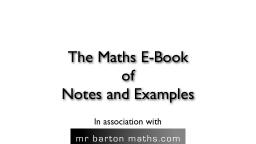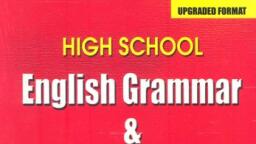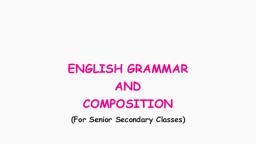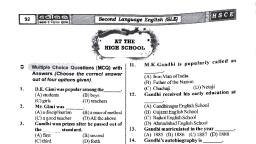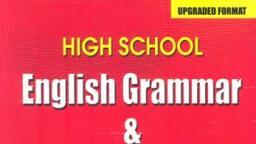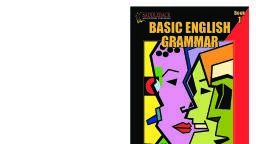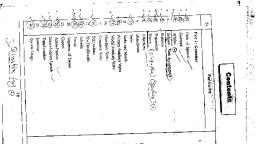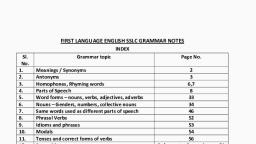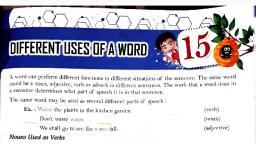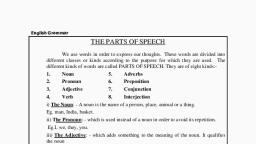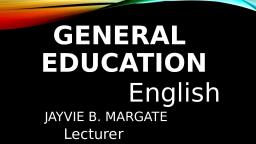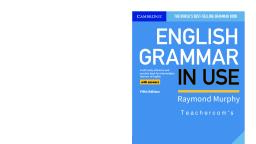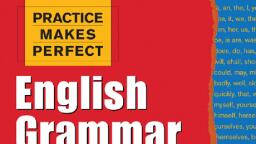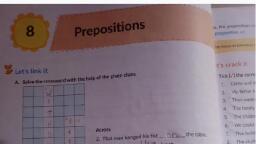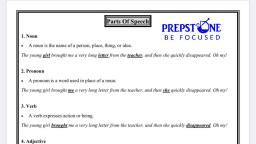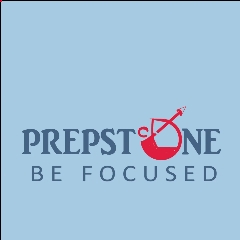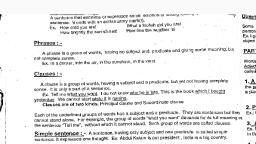Page 1 :
HIGH SCHOOL, ENGLISH GRAMMAR, , , , , , , , , , CHAPTER 1, THE SENTENCE, , , , , , 1. When we speak or write we use words. We generally use these, words in groups; as,, Little Jack Horner sat in a corner., , A group of words like this, which makes complete sense. is called, a Sentence., , Kinds of Sentences, 2. Sentences are of four kinds :—, , (1) Those which make statements or assertions: as,, Humpty Dumpty sat on a wall., (2) Those which ask questions: as, Where do you live ?, (3) Those which express commands, requests, or entreaties:, as,, Be quiet, Have mercy upon us., (4) Those which express strong feelings: as,, How cold the night is !, What a shame !, , A sentence that makes a statement or assertion is called a Declarative or Assertive sentence., , A sentence that asks a question is called an Interrogative sentence., , A sentence that expresses a command or an entreaty is called an, Imperative sentence., A sentence that expresses strong feeling is called an Exclamatory sentence., ce CHAPTER 2 semememmemmmmmmn, SUBJECT AND PREDICATE, , 3. When we make a sentence—, , (1) We name some person or thing; and, (2) Say something about that person or thing., , 1
Page 2 :
2 HIGH SCHOOL ENGLISH GRAMMAR, , _ In other words, we must have a subject to speak about and we, must say or predicate something about that subject., * Hence every sentence has fwo parts—, (1) The part which names the person or thing we are speaking, about. This is called the Subject of the sentence., (2) The part which tells something about the Subject. This is called, the Predicate of the sentence., 4. The Subject of a sentence usually comes first, but occasionally, it is put after the Predicate ; as,, Here comes the bus., Sweet are the uses of adversity., 5. In Imperative sentences the Subject is left out; as,, Sit down. [Here the Subject You is understood]., Thank him. [Here too the Subject You is understood.], , Exercise in Grammar 1, , In the following sentences separate the Subject and the Predicate:—, , The crackling of geese saved Rome. 15. The early bird catches the worm., , , , , , 1., 2. The boy stood on the burning deck. 16. All mater is indestructible., 3. Tubal Cain was a man of might. 17, Islamabad is the capital of Pakistan., 4. Stone walls do not make a prison. ‘18. We should profit by experience., 5. The singing of the birds delights us. 19. All roads lead to Rome., 6. Miss Kitty was rude at the table one 20. A guilty conscience needs no, , day. excuse,, 7. He has a good memory. 21. The beautiful rainbow soon faded, 8. Bad habits grow unconsciously. away., 9. The earth revolves round the sun, 22. No man can serve two masters., , 10. Nature is the best physician. A sick room should be well aired., , 11. Edison invented the phonograph. The dewdrops glitter in the, , 12. The sea hath many thousand sands. sunshine., , 13. We cannot pump the ocean dry. I shot an arrow into the air., , 14. Borrowed garments never fit A barking sound the shepherd hears., well. On the top of the hill lives a hermit., , , , , , os CHAPTER 3 neces, , THE PHRASE AND THE CLAUSE, , 6. Examine the group of words “in a corner”. It makes sense, but, not complete sense. Such a group of words, which makes sense, but, not complete sense, is called a Phrase., , In the following sentences, the groups of words in italics are, Phrases: —, , The sun rises in the east., Humpty Dumpty sat o7 a wall., There came a giant fo my door.
Page 3 :
PARTS OF SPEECH 3, , It was a sunset of great beauty., The tops of the mountains were covered with snow., Show me how to do it., 7, Examine the groups of words in italics in the following sentences:—, He has a chain of gold., He has a chain which is made of gold., We recognize the first group of words as a Phrase., , The second group of words, unlike the Phrase of gold, contains a, Subject (which) and a Predicate (is made of gold)., , Such a group of words which forms part of a sentence, and contains a Subject and a Predicate, is called a Clause., , In the following sentences, the groups of words in italics are, Clauses :-—, People who pay their debts are trusted., We cannot start while it is raining., I think that you have made a mistake., , ees CHAPTER 4 sucess, , PARTS OF SPEECH, , 8. Words are divided into different kinds or classes, called Parts, of Speech, according to their use ; that is, according to the work they, do in a sentence. The parts of speech are eight in number :—, , 1. Noun 2. Adjective. 3. Pronoun. 4. Verb., , 5. Adverb. 6. Preposition. 7. Conjunction. 8. _Interjection., , 9. A Noun is a word used as the name of a person, place, or, thing; as,, , Akbar was a great King., Kolkata is on the Hooghly., The rose smells sweet., , The sun shines bright, , His courage won him honour., , Note.—The word thing includes (i) all objects that we can, see, hear, taste, touch, or smell; and (ii) something that we can think, of, but cannot perceive by the senses., , 10. An Adjective is a word used to add something to the meaning of a noun ; as,, , He is a brave boy., There are twenty boys in this class., 11. A Pronoun is a word used instead of a noun; as,, , John is absent, because he is ill., The books are where you left them.
Page 4 :
4 ; HIGH SCHOOL ENGLISH GRAMMAR, , 12. A Verb is a word used to express an action or state: as, The girl wrote a letter to her cousin, Kolkata és a big city., Iron and copper are useful metals, , , , 13. An Adverb is a word used to add something to the meaning, of a verb, an adjective. or another adverb ; as., He worked the sum quickly., This flower is very beautiful,, She pronounced the word quite correctly., 14. A Preposition is « word used with a noun or a pronoun to, show how the person or thing denoted by the noun or pronoun stands, in relation to something else: as., , , , There is a cow in the garden., The girl is fond of music., A fair little girl sat under a tree., , , , 15. A Conjunction is a word used to join words or sentences:, as,, Rama and Hari are cousins, Two and two make four, fran fast. but missed the train., 16. An Interjection is a word which expresses some sudden feel, ing: as., , , , Hurrah ! we have won th, Alas ! she is dead., , 17. Some modern grammers include determiners among the parts, of speech. Determiners are words like a. an, the, this, that, these. those., every, each, some, any, my, his, one, two, etc.. which determine or, limit the meaning of the nouns that follow. In this book, as in many, traditional grammars, all determiners except a, an and the are classed, among adjectives., , 18. As words are divided into different classes according to the, work they do in sentences, it is clear that we cannot say to which part, of speech a word belongs unless we see it used in a sentence., , me., , , , , , , , They arrived soon after. (Adverb), They arrived after us. (Preposition), They arrived after we had left. (Conjunction), From the above examples we see that the same word can be used, as different parts of speech., , , , Exercise in Grammar 2, , Name the part of speech of each italicized word in the following, sentences, giving in each case your reason for the classification:—, , 1. Still waters run deep. 4. Theafter eftects of the drug are bad., 2. He still lives in that house 5. The up train is late., 3. Affer the storm comes the calm. 6. It weighs about a pound.
Page 5 :
THE NOUN : KINDS OF NOUNS 5, , 7. He told us all about the battle. 12. He is om the committee., 8. He was only a yard off me. 13. Let us move on., 9. Suddenly one of the wheels came off. 14. Sit down and rest a while, 10. Mohammedans fast in the month 15. Twill watch while you sleep., of Ramzan. 16. They while away their evenings, 11, He kept the fast for a week. with books and games., , A work from $. CHAND & COMPANY LTD., , omens CHAPTER 5 een, , THE NOUN : KINDS OF NOUNS, 19. A Noun is a word used as the name of a person. place or, thing., Note.—The word thing is used to mean anything that we can, think of., , 20. Look at the following sentence :—, Asoka was a wise king., The noun Asoka refers to a particular king, but the noun king, , might be applied to any other king as well as to Asoka. We call Asoka, a Proper Noun, and king a Common Noun., , Similarly: —, , Sita is a Proper Noun, while girl is a Common Noun., Hari is a Proper Noun. while boy is a Common Noun., Kolkata im, isa Proper Noun, while city ix a Common Noun, India is a Proper Noun, while country is a Common Noun., The word girl is a Common Noun, because it is a name common, to all girls, while Sita is a Proper Noun because it is the name of a, particular girl., Def.—A Common Noun is a name given in common to every, person or thing of the same class or kind., [Common here means shared by all.|, Def.—A Proper Noun is the name of some particular person or, place., [Proper means one’s own. Hence a Proper Name is a person’s, own name.]}, Note 1—Proper Nouns are always written with a capital letter at, the beginning., Note 2 —Proper Nouns are sometimes used as Common Nouns, as,, 1. He was the Lukman (= the wisest man) of his age., 2, Kalidas is often called the Shakespeare (= the greatest dramatist) of, India., Common Nouns include what are called Collective Nouns and, Abstract Nouns.

